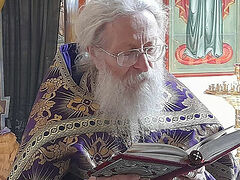Part 1: Christian Exorcism and Holiness
Part 2: Baptism, and Eight Steps to Casting Out Our Own Demons
—Batiushka, I recently baptized a seven-year-old girl. I knew her grandmother, who brought her to Sunday school, but I found out later that this girl wasn’t baptized. How could I admit her to Sunday school if she wasn’t baptized? I had to baptize her first, but the woman told me that unless Metropolitan Sergiy agreed to be her godfather, she wouldn’t baptize her. I told her that I was sorry, but that would be impossible. Six months later, she agreed to have the girl baptized.
Father Gennady:
—Why didn’t she ask for it to be held in River Jordan?
Question:
—I think she will ask that next time. Besides, they have a tough family situation. This girl’s parents aren’t around. I didn’t bother to ask where they were. Her grandma brings her up alone. The girl gets out of control all the time. But her grandmother says she wasn’t like that before. Still, she really acts up in public, calling her grandmother names and swearing all the time. Once inside the church, she starts screaming. And when I began the ceremony of her baptism, we saw all of that: once we started the prayers, she fell on the ground, screamed at her grandmother and cried. It even gave me the creeps. Her behavior grew more intense with every new prayer, but it would subside once the prayers stopped. It is hard to say if she was possessed, since we knew how ill-bred she was. It did feel like it, though. Even when I met her for the first time, I had the feeling that she was somehow under the influence of dark spirits. I can’t state it with confidence, because she is so badly behaved. But this suspicion has never left me.
Father Gennady:
—Yes, the thing is, there exist different levels of possession. There are, as you say, ill-bred people. Also, children behave abnormally during Baptism simply because they are in unusual surroundings. They tend to get scared in unfamiliar circumstances. They get scared of seeing a doctor, or someone else. It’s the same here, with all those icons, and a man who wears clothing this child has never seen before, or who has a beard that the child may not have seen before, either. So, everything is out of the ordinary.
Then, there are those different actions going on all the time: first they anoint him with oil, then they cut his hair, then they blow at him, or do something else. It’s all pure psychology. That’s why we have to suggest to the parents that they attend church services during the catechization. We all know that it’s not a big deal to baptize an infant at two weeks, or a month or two months old. But when he’s four or five years old, it becomes extremely difficult. It gets tough even when they are two or three years old. All that shrieking, that mayhem, as they kick and push. And the priests, but even more so the ladies who are helping us in the baptistery, they are saying, “It’s a demon, there are demons.” But this is no demon, I tell you.
Things like that should be resolved on the basis of psychology. Then, there are things that have to do with psychiatry. We have organs directly connected with that. Say, our brain. A brain and mind are different things in humans. The mind is about the ideal, while brain is about the material matters. Okay, we can damage the brain. That’s it: you won’t be able to do a math problem. There are material instruments that allow our mind to perform.
If I am, say, an excellent runner, but if you give me a pair of shoes that doesn’t fit, I won’t be able to finish the course. It’s same in this situation when a sick brain won’t allow the mind to function properly. Neither can the soul utilize its resources when it is damaged on neurological level. This is a matter of psychiatry, not exorcism.
The same Met. Anthony of Sourozh, whom we have already mentioned more than once, was a practicing physician. So, he comes to a monastery one day, incidentally, at the very time when a priest was actively engaged in exorcism. So, he observes what the priest is doing and his physician’s eye sees how this particular person has got a mild case of psychiatric illness. He prescribes some medicine for her, and yet something else, and she gets better. So, after that, Vladyka came down hard against that priest, but not—I hope you understand—against exorcism prayers.
There are cases like that. Or, there are those who are seized. It means that the spirit didn’t enter or settle in his soul, but the man is seized. It is already a matter of exorcism. Finally, we have cases when the spirit enters a man. That’s when he can speak strangely and perform actions unnatural to a normal human being. The spirit can thrust him around and give him enormous physical powers or, on the contrary, make him helpless. So, yes, there are various stages. No priest, or I think even not every grace-filled elder, will be able to make an accurate assessment, just as in the medical field. Sometimes doctors can’t present the correct diagnosis of a disease. So, what is to be done? We can pray over a person. We may not know exactly what is going on with him. Or we shouldn’t pretend to know it all, saying, “Oh, I know what’s what, I see it, I am going to tell you all about it.”
That is, on the one hand, yes, we must discern the difference between these cases. Besides, a person should be taught and trained to feel comfortable at church. This is a matter of psychiatry and we don’t necessarily have to exorcize an unclean spirit every time. But since we can’t definitely state the diagnosis, we can continue to pray for everyone, as we do at the Holy Unction service. We do pray for everyone during it, but do we know their diagnosis? No. Do we understand what he is afflicted with or ails him? No. But what we do know is that he is injured or sick. So, we pray. And the grace of God acts in him. The same is true with exorcism. We don’t know in every detail what is going on inside this person. But we pray and the grace of God acts.
Over-Familiarity
Question:
—Fr. Sergiy Timoshenko. I actually have two questions, if I may, or if we have enough time.
The first one is about our previous lecture. You said that there is a certain area of friendly interaction between the laity and a priest that may lead to undesirable consequences. Could you specify what its features are and how not to cross that line to avoid any temptations?
Fr. Gennady:
—At first, we notice that a certain lady parishioner treats you really well. It happens with women more often than with men. So, you notice that they have made a cult around you. It can also happen among the male members of the church, too—situations vary. So, you see they make too much of your persona and that feels nice. Okay, it feels good. They speak nicely about you. You are treated with reverence and so on. But then, you begin to notice that they hang on every word of yours. And that should be stopped.
Or, it could start with an expression of love, but later she begins to go over the top. That’s the moment when you need to remember that you can’t commit adultery. It transitions subtly, changing from one state to another. The priest, of course, must watch out for changes in his attitude to a spiritual child and stop it from morphing into wanton passion. Besides, it will take the spiritual child some time to even notice it, because she is a “child”. Since you are a father, you will be held accountable to a greater extent. You will notice it and understand it sooner. After all, that’s what you were taught. You have to pull back in time, when you realize that you are already, as they call it, carried away.
—For sure, Batiushka. One more question. You also mentioned over-familiarity. How does that happen?
Father Gennady:
—I am not sure. We should have brotherhood. That’s what we often don’t have. We may have a certain type of structure or an organization, but there should be brotherhood. As for over-familiarity, it probably happens when you lose your sense of reverence. As long as there is reverence, there is no over-familiarity. Besides, the spiritual father should treat his spiritual flock with reverence. It is the same with regards to the spiritual children—they should treat their spiritual father and, accordingly, his ministry, with reverence. Over-familiarity means losing that reverent attitude.
Besides, the spiritual father should treat his spiritual flock with reverence. The same with the spiritual children—they should treat their spiritual father with reverence
Priest Sergiy Timoshenko:
—Well, there was the following incident in my ministry (I’ve had more than ten years of service). I baptized a girl, but the girl behaved quite aggressively. She fought with me. A young child, only two or three years old. I had never had it happen like that before, simply never had had anything like that. I felt somewhat embarrassed, and, during her baptism, I was overcome with thoughts. By the end of the baptism, I think, the Lord put the following thought into my mind: What if her parents have been involved with occult practices? Because it was obvious that her mother felt quite uncomfortable, she didn’t expect anything like that, since her daughter was generally a quiet child. But at baptism, her aggressive behavior was generally beyond comprehension.
So, when I came to her later as they were packing after the christening and asked whether she had ever gone to see any witches, psychic healers, mediums, or such like. She gave me such a surprised look, you could tell she felt awkward: “There was a time when my husband was about to leave me, so yes, I did.” In this respect, my question to you is the following: Does the fact that parents turn to occult practices have a direct effect on children?
Father Gennady:
—Our field is unlike mechanics. Say, in mechanics, or electricity, everything is absolutely precise. So, of course, we don’t have such a rigid connection, and it isn’t mechanical. Sure, when parents are involved in occult practices to one degree or another, they put their children in danger. It means they have to think first and act responsibly. But people don’t get it. Yes, we bear responsibility for this. That’s why it’s the parents’ job to protect the child and to keep him safe. But that’s the subject of another lecture. Certainly, children are fragile. Besides, children are easily susceptible to otherworldly beings. They are more susceptible than adults. Therefore, a child should be protected both psychologically and spiritually from all these dark influences. So the answer is yes, this could be the case.




